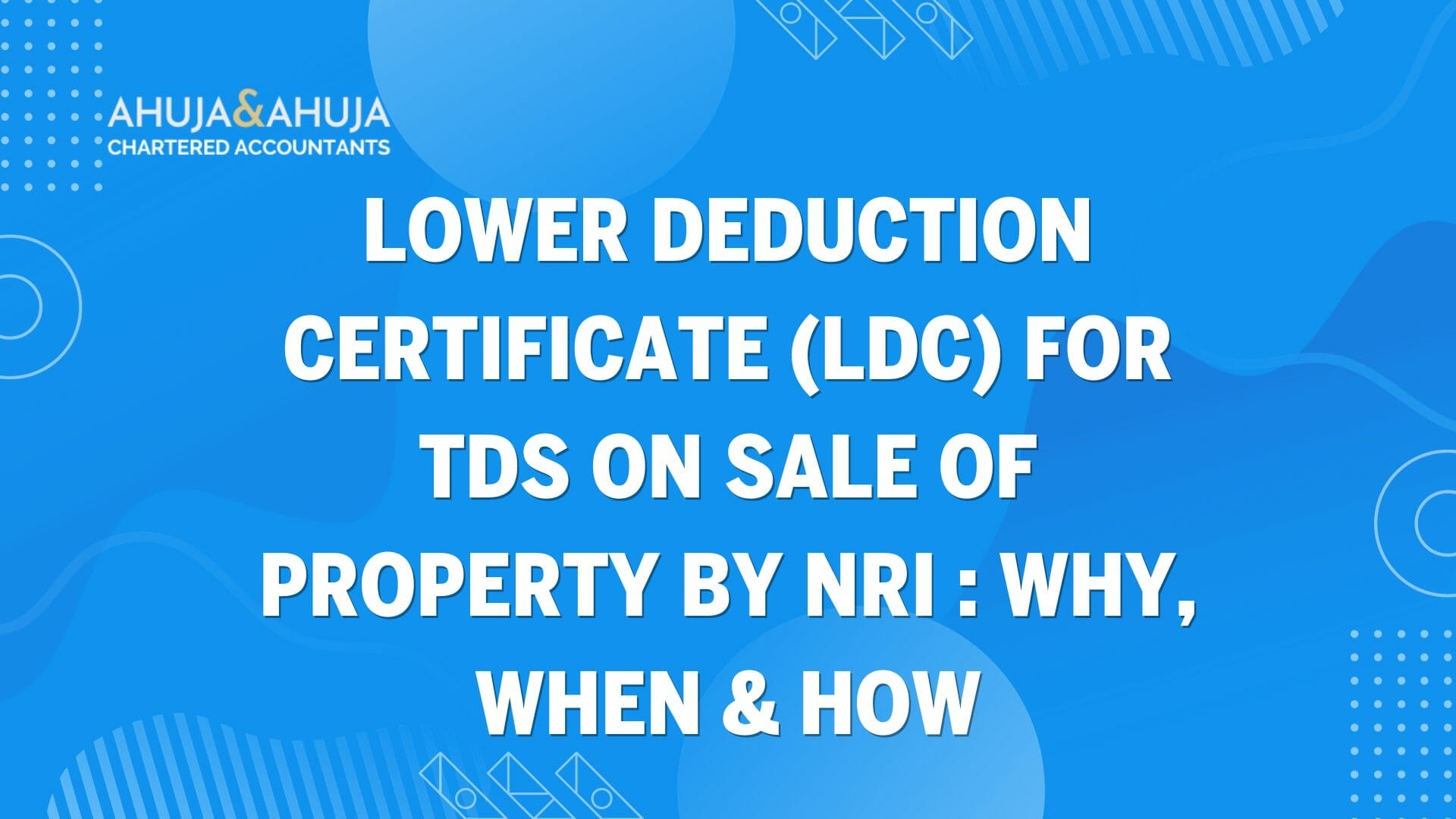Lower Deduction Certificate (LDC) for TDS on Sale of Property by NRI : Why, When & How
As an NRI (Non-Resident Indian), in the midst of the hustle and bustle of life across borders, it’s common to overlook aspects related to your property back in India. Property transactions indeed involve a good deal of complexity, especially when it comes to taxation rules for NRI property sales in India. Here, we are addressing the subject of Tax Deducted at Source (TDS) implications when NRIs sell properties in India.
TDS in India has been a significant bone of contention – with it reaching rates as high as 20% plus surcharge and cess, its application on property sales often brings in a degree of financial duress for NRIs. The confusion, however, doesn’t end here. The applicability of Tax Deducted at Source (TDS) reaches a new level of complexity when NRIs sell properties in India. When an NRI sells a property, the buyer is obliged by law to deduct TDS, making it crucial for NRIs to understand the rules involved.
As you invest time, money, and effort in these property transactions, a lack of clarity about this financial aspect can lead to less-than-desirable outcomes. For instance, an unreasonably high TDS might result in a sizable chunk of your property sale proceeds being unnecessarily blocked for an extended period, pending refund from the tax department.
With that said, there’s a silver lining under the Income Tax Act for the embattled NRI sellers like yourself who are struggling to recover their rightful proceeds from property sales – The Lower Deduction Certificate (LDC).
In this comprehensive guide, we aim to demystify the convolutions around LDC, helping you sail smoothly through your property transactions in India.
Understanding TDS and the Income Tax Act
Tax Deducted at Source, widely known as TDS, is an inroad made into your taxable income. This method is employed to minimise tax evasion by enforcing that tax is deducted at the preliminary point itself. The responsibility is on the buyer of the property to deduct this tax and directly deposit with the income tax authorities.
The rate of deduction varies based on the tax status of the seller (resident vs non-resident) as well as the property’s transaction value.
As per Section 194IA of the Income Tax Act, an Indian resident seller would have 1% tax on the sale consideration deducted if it is at least Rs. 50 lakhs. However, in the case of an NRI seller, tax laws dictate that irrespective of the transaction value, the buyer must withhold 20% tax plus cess as well as surcharge. This tax must be deducted from the entire sale consideration. Notably, even if the property value is less than INR 50 lakhs, due to the NRI status of the seller, tax still needs to be withheld. The law thus places an obligation on the buyer to collect this tax and deposit it with the Indian tax authorities on behalf of the NRI seller.
Exploring the concept of Lower Deduction Certificate (LDC)
A Lower Deduction Certificate (LDC) is a valuable mechanism provided by the Income Tax Act that allows NRIs selling their properties in India to have a reduced rate of TDS deduction or even exempt them from TDS altogether. This certificate serves as a means to bridge the gap between the actual tax liability of the seller and the higher TDS rates that would otherwise be applied.
The primary purpose of obtaining an LDC is to avoid the excessive deduction of TDS, which can result in unutilized funds being blocked until the filing of the income tax return and the subsequent refund process. By applying for an LDC, NRIs can ensure that TDS is deducted at a rate more closely aligned with their actual capital gains tax liability. This enables them to receive a larger portion of the sale proceeds upfront, rather than having to wait for the refund after the completion of the tax return filing.
The benefits of obtaining an LDC are twofold. Firstly, it helps NRIs avoid the unnecessary inconvenience of paying higher TDS and subsequently claiming a refund, which can be a time-consuming process. Secondly, it allows NRIs to utilize a significant portion of the sale proceeds immediately, offering greater financial flexibility and liquidity.
Procedure to apply for Lower Deduction Certificate (LDC)
Applying for a Lower Deduction Certificate (LDC) involves a straightforward process that can be done online. The following steps outline the procedure for NRIs to apply for an LDC:
1. Form 13 Application: To begin the application process, NRIs need to fill out Form 13, which is available on the government portal for tax-related services (Traces). This form serves as the official application for obtaining an LDC.
2. Required Documents: Along with the application form, NRIs are required to submit several documents to support their request for an LDC. These documents may include:
- Email ID and phone number of the applicant
- Agreement of sale between the buyer and seller
- Tax Deduction and Collection Account Number (TAN) copy of the buyer (if applicable)
- Copy of the NRI/foreign citizen seller’s passport
- Circle value of the property certified by the regulating authority
- Stamped and executed purchase deed of the property
- Bank account statement of the NRI held in India
- Income Tax Returns (ITR) filed by the NRI for the past 2-3 years
- Tax records and statements under Form 26AS for the past 2-3 years
3. Assessing Officer’s Review: Once the application is submitted successfully, an Assessing Officer (AO) will review the documents and information provided. The AO may request additional information or supporting documentation if required before making a decision on issuing the LDC.
4. Certificate Issuance: If the AO finds the application justifiable for a lower TDS deduction, they will issue the Lower Deduction Certificate under Section 197. The certificate specifies the rate at which the TDS should be deducted.
5. TDS Deduction: Once the Lower Deduction Certificate has been successfully issued, the buyer of the property will deduct TDS based on the rate mentioned in the certificate. The certificate is available for download by the taxpayer (NRI) from the Income Tax Portal.
It is important to note that the processing time for the Lower Deduction Certificate may range from 3 to 6 weeks, as it involves the AO submitting the application to the TDS officer and their seniors for approval.
Applicability and Validity of Lower Deduction Certificate (LDC)
The Lower Deduction Certificate (LDC) holds relevance in specific scenarios and is not always required for every property sale transaction involving NRIs. It is essential to understand the applicability and validity of the LDC.
1. When LDC is not needed: In certain cases where the actual capital gains tax liability is higher than the TDS deduction, NRIs may choose not to apply for an LDC. This typically occurs when the TDS rate is lower than the actual tax liability, allowing NRIs to claim a refund after filing their income tax return.
2. Validity of LDC: A Lower Deduction Certificate is issued for a specific fiscal year and at a rate in line with the actual capital gains calculations. Unless revoked by the Assessing Officer prior to expiration, the LDC remains valid from the date of issuance until the end of the applicable financial year.
It is worth noting that when NRIs purchase property from other NRIs, they also have the option to deduct tax at a lower rate by submitting Form 13 to the Jurisdictional Assessing Officer. In such cases, the buyer deducts TDS on the total consideration as per the rate specified in the Lower Deduction Certificate.
Case Study: Mr. A’s Experience
To provide a practical understanding of the Lower Deduction Certificate (LDC) process, let’s consider a case study.
Case: Mr. A, an NRI from the UK, is selling a property in India with a sale value of INR 100. The buyer insists on deducting INR 23 as taxes, leaving Mr. A with INR 77. However, when considering the actual capital gains tax calculation, Mr. A’s liability is approximately INR 3.5. There is an extra deduction of INR 19.5, which Mr. A will only recover after filing his income tax return. As the transaction is being undertaken in January ’23, Mr. A will file the tax return for the financial year 2022-2023 in July ’23. The subsequent refund is typically issued within 12-18 months after the ITR is processed. Thus, Mr. A will have his INR 19.5 blocked for 12-18 months.
In this scenario, Mr. A would benefit from applying for a Lower Deduction Certificate (LDC). By doing so, he can ensure that the TDS is deducted at a lower rate, aligned with his actual capital gains tax liability. This would enable him to receive a larger portion of the sale proceeds upfront, avoiding the extended waiting period for the refund.
The case study demonstrates the practical significance of the Lower Deduction Certificate (LDC) in maximizing the immediate realization of funds for NRIs selling their properties in India.
Frequently Asked Questions (FAQs)
What is the purpose of applying for a Lower Deduction Certificate (LDC) as an NRI selling property in India?
The purpose of obtaining an LDC is to avoid excessive TDS deduction during the property sale transaction, allowing NRIs to receive a larger portion of the sale proceeds upfront and avoid the lengthy refund process.
How can an NRI apply for a Lower Deduction Certificate (LDC) under Section 197?
NRIs can apply for an LDC online by filling out Form 13 on the government portal (Traces) and submitting the necessary supporting documents.
What documents are required to be submitted for the application of an LDC?
The required documents may include the applicant’s email ID and phone number, the agreement of sale, TAN copy of the buyer, passport copy of the NRI seller, circle value of the property, purchase deed, bank account statement, ITR filings, and tax records for the past 2-3 years.
How long does it take to process the Lower Deduction Certificate (LDC)?
The processing time for the LDC typically ranges from 3 to 6 weeks, as it involves the Assessing Officer reviewing the application and forwarding it for approval.
Is the Lower Deduction Certificate (LDC) valid indefinitely?
No, the LDC is valid for a specific fiscal year until the end of the applicable financial year unless revoked by the Assessing Officer.
Can the buyer deduct tax at a lower rate when purchasing property from an NRI?
Yes, if the NRI seller has obtained an LDC, the buyer can deduct TDS at the rate mentioned in the certificate.
Conclusion
In conclusion, the Lower Deduction Certificate (LDC) serves as a powerful tool for Non-Resident Indians (NRIs) selling their properties in India. By obtaining an LDC, NRIs can ensure that the Tax Deducted at Source (TDS) is deducted at a lower rate, aligning with their actual capital gains tax liability. This enables NRIs to receive a significant portion of the sale proceeds upfront, avoiding the lengthy refund process and providing greater financial flexibility.
The LDC application process involves filling out Form 13 and submitting the necessary supporting documents to the Assessing Officer (AO). The AO reviews the application and, if satisfied, issues the Lower Deduction Certificate specifying the applicable TDS rate.
It is important to note that the LDC is valid for a specific fiscal year until the end of the applicable financial year, unless revoked by the AO. NRIs should consider the applicability of the LDC based on their specific circumstances and consult with a tax professional for guidance.
By utilizing the Lower Deduction Certificate (LDC), NRIs can optimize their selling experience in the Indian real estate market and unlock the immediate realization of a substantial portion of the sale proceeds.
Disclaimer
The materials provided herein are solely for educational and informational purposes. No attorney/professional-client relationship is created when you access or use the site or the materials. The information presented on this site does not constitute legal or professional advice and should not be relied upon for such purposes or used as a substitute for professional or legal advice.





